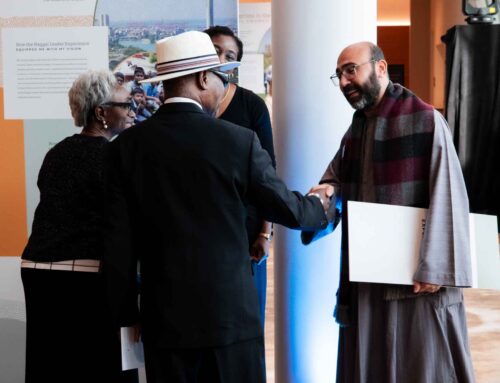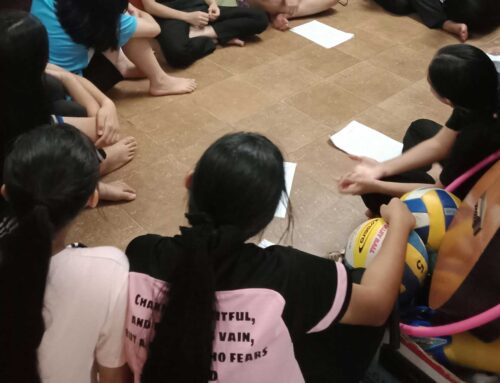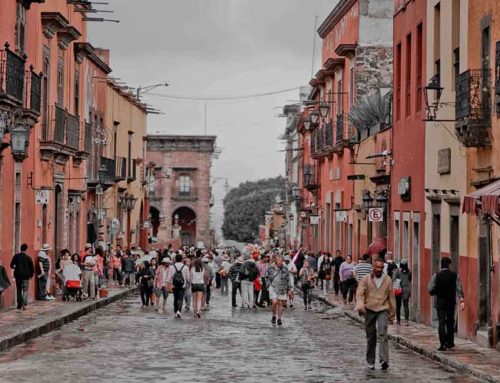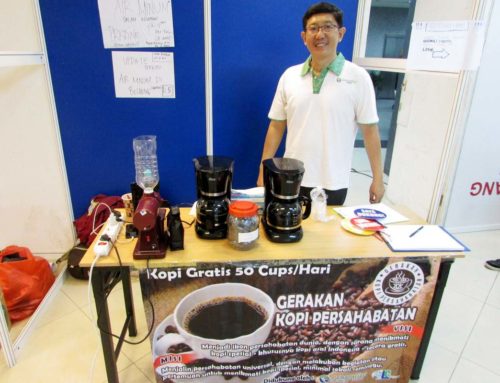Global Insight
In June, we hosted our first-ever Global Insight Forum. We gathered (virtually) nearly 60 of our most pioneering Haggai leaders to dig deeper into the experiences, insights, and innovations of our global network. For decades, we’ve invested in tens of thousands of Kingdom leaders serving in places of greatest need. Now it’s time to learn from them. We want to better understand the challenges and opportunities, and joys and sorrows, our leaders face as they follow Jesus into a broken world.
More than anything, our leaders described a world of growing isolation, fragmentation, and division. Fragmentation exists in interpersonal relationships, in society, and in the Church. Participants lamented that divisiveness and competition within the global Body of Christ is devastating our collective witness to the Gospel and is alienating so many from the life-giving power of fellowship and friendship in Christ. In Church and society, forum conversations also revealed a widening gap between the generations. Digital media, urbanization, and the rise of consumerism around the world funnel people into narrow, isolated groups. Our leaders are not removed from these changes. As one forum participant stated: “Without an understanding of the next generation’s cultural language, we tend to attack rather than embrace.”
And as our leaders follow Christ into a fragmented and hurting world, they are not immune from its brokenness. One of our leaders described the burnout, struggle, and discouragement of serving among the most vulnerable: “We work with 200 teenage women who have 200,000 problems for which we have no answer.” The forum underscored how many of our leaders are, in fact, more fragile because of their transformative work. They carry the sorrows and wounds of Christ through what they do. Their work makes them more vulnerable to anxiety, depression, and loneliness, not less. It reminds me of Jesus’ commission to the disciples in the Gospel of John: “As the Father sent me, so I am sending you…” (John 20:21) Like the disciples, God’s love invites us to leave our locked rooms to journey into a world of need, trusting that taking up the cross is the way to new life, for us and for others. We find life in the vulnerability of faith, faith that the way of Jesus is the only way.
While the world’s brokenness and fragmentation impact our leaders, the forum showed how they are responding through the promotion of restoration, community, and wholeness. During the forum, collaboration stood out as the primary missional strategy our leaders employ in our changing world. Many leaders are shifting from empowering individual leaders to catalyzing collectives. As one participant who is pioneering a church planting movement in urban Ecuador shared: “We now produce teams, not leaders.” What we are hearing from our global network is a pushback against overly individualistic, often Western paradigms of Kingdom work to ones that find power in faith-filled community. Not only are such models effective, but they also nurture the always abiding need for relationship. Our Global Insight initiatives— even our virtual ones —are centered not just on the sharing of information and innovation but also the sharing of lives, of fellowship, bound together by God’s loving movement into the world. Nothing is more pressing in an age fraught with fragmentation. Restoration is the means and the end of the Gospel.
Global Insight
In June, we hosted our first-ever Global Insight Forum. We gathered (virtually) nearly 60 of our most pioneering Haggai leaders to dig deeper into the experiences, insights, and innovations of our global network. For decades, we’ve invested in tens of thousands of Kingdom leaders serving in places of greatest need. Now it’s time to learn from them. We want to better understand the challenges and opportunities, and joys and sorrows, our leaders face as they follow Jesus into a broken world.
More than anything, our leaders described a world of growing isolation, fragmentation, and division. Fragmentation exists in interpersonal relationships, in society, and in the Church. Participants lamented that divisiveness and competition within the global Body of Christ is devastating our collective witness to the Gospel and is alienating so many from the life-giving power of fellowship and friendship in Christ. In Church and society, forum conversations also revealed a widening gap between the generations. Digital media, urbanization, and the rise of consumerism around the world funnel people into narrow, isolated groups. Our leaders are not removed from these changes. As one forum participant stated: “Without an understanding of the next generation’s cultural language, we tend to attack rather than embrace.”
And as our leaders follow Christ into a fragmented and hurting world, they are not immune from its brokenness. One of our leaders described the burnout, struggle, and discouragement of serving among the most vulnerable: “We work with 200 teenage women who have 200,000 problems for which we have no answer.” The forum underscored how many of our leaders are, in fact, more fragile because of their transformative work. They carry the sorrows and wounds of Christ through what they do. Their work makes them more vulnerable to anxiety, depression, and loneliness, not less. It reminds me of Jesus’ commission to the disciples in the Gospel of John: “As the Father sent me, so I am sending you…” (John 20:21) Like the disciples, God’s love invites us to leave our locked rooms to journey into a world of need, trusting that taking up the cross is the way to new life, for us and for others. We find life in the vulnerability of faith, faith that the way of Jesus is the only way.
While the world’s brokenness and fragmentation impact our leaders, the forum showed how they are responding through the promotion of restoration, community, and wholeness. During the forum, collaboration stood out as the primary missional strategy our leaders employ in our changing world. Many leaders are shifting from empowering individual leaders to catalyzing collectives. As one participant who is pioneering a church planting movement in urban Ecuador shared: “We now produce teams, not leaders.” What we are hearing from our global network is a pushback against overly individualistic, often Western paradigms of Kingdom work to ones that find power in faith-filled community. Not only are such models effective, but they also nurture the always abiding need for relationship. Our Global Insight initiatives— even our virtual ones —are centered not just on the sharing of information and innovation but also the sharing of lives, of fellowship, bound together by God’s loving movement into the world. Nothing is more pressing in an age fraught with fragmentation. Restoration is the means and the end of the Gospel.
Global Insight
In June, we hosted our first-ever Global Insight Forum. We gathered (virtually) nearly 60 of our most pioneering Haggai leaders to dig deeper into the experiences, insights, and innovations of our global network. For decades, we’ve invested in tens of thousands of Kingdom leaders serving in places of greatest need. Now it’s time to learn from them. We want to better understand the challenges and opportunities, and joys and sorrows, our leaders face as they follow Jesus into a broken world.
More than anything, our leaders described a world of growing isolation, fragmentation, and division. Fragmentation exists in interpersonal relationships, in society, and in the Church. Participants lamented that divisiveness and competition within the global Body of Christ is devastating our collective witness to the Gospel and is alienating so many from the life-giving power of fellowship and friendship in Christ. In Church and society, forum conversations also revealed a widening gap between the generations. Digital media, urbanization, and the rise of consumerism around the world funnel people into narrow, isolated groups. Our leaders are not removed from these changes. As one forum participant stated: “Without an understanding of the next generation’s cultural language, we tend to attack rather than embrace.”
And as our leaders follow Christ into a fragmented and hurting world, they are not immune from its brokenness. One of our leaders described the burnout, struggle, and discouragement of serving among the most vulnerable: “We work with 200 teenage women who have 200,000 problems for which we have no answer.” The forum underscored how many of our leaders are, in fact, more fragile because of their transformative work. They carry the sorrows and wounds of Christ through what they do. Their work makes them more vulnerable to anxiety, depression, and loneliness, not less. It reminds me of Jesus’ commission to the disciples in the Gospel of John: “As the Father sent me, so I am sending you…” (John 20:21) Like the disciples, God’s love invites us to leave our locked rooms to journey into a world of need, trusting that taking up the cross is the way to new life, for us and for others. We find life in the vulnerability of faith, faith that the way of Jesus is the only way.
While the world’s brokenness and fragmentation impact our leaders, the forum showed how they are responding through the promotion of restoration, community, and wholeness. During the forum, collaboration stood out as the primary missional strategy our leaders employ in our changing world. Many leaders are shifting from empowering individual leaders to catalyzing collectives. As one participant who is pioneering a church planting movement in urban Ecuador shared: “We now produce teams, not leaders.” What we are hearing from our global network is a pushback against overly individualistic, often Western paradigms of Kingdom work to ones that find power in faith-filled community. Not only are such models effective, but they also nurture the always abiding need for relationship. Our Global Insight initiatives— even our virtual ones —are centered not just on the sharing of information and innovation but also the sharing of lives, of fellowship, bound together by God’s loving movement into the world. Nothing is more pressing in an age fraught with fragmentation. Restoration is the means and the end of the Gospel.
Comments
Comments
-
Insightful .
May God Almighty bless every effort in ending gospel poverty. The fight starts on our knees.
















Insightful .
May God Almighty bless every effort in ending gospel poverty. The fight starts on our knees.